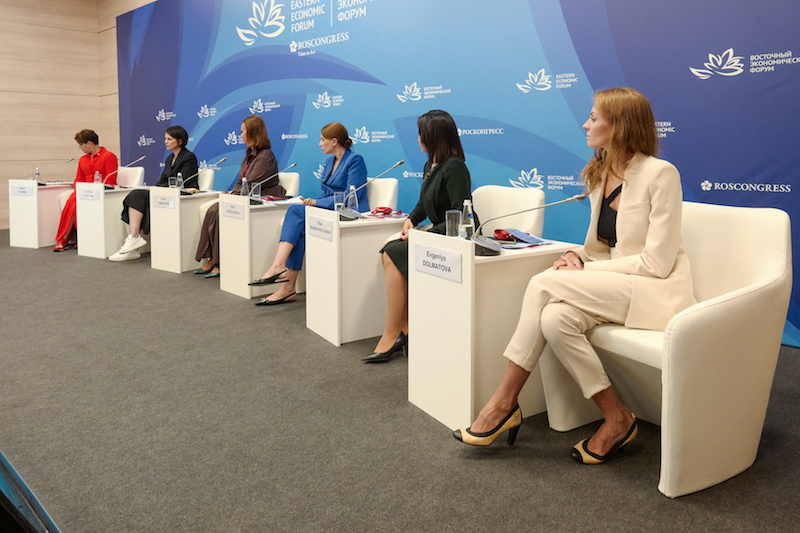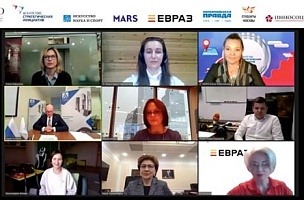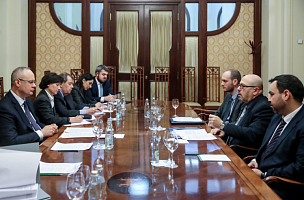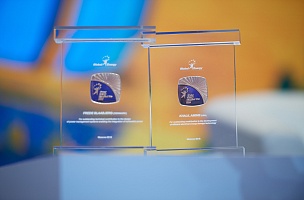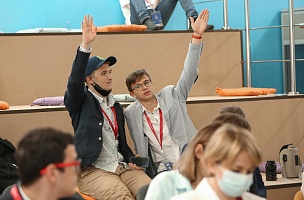KEY CONCLUSIONS
Female leaders possess important skills which can be shared with one another
“This movement [of the EAWF, or Eurasian Women’s Forum – ed.] only came to be when we all felt a need to promote female leaders. And this is a very important thing to do, because we possess a subtle mind and tact. We are always endeavouring to protect the planet, to protect the hearth, and strengthen it. This is very important indeed. And when we felt that female leaders play an enormous role in society, that was when this movement arose,” Lyudmila Talabaeva, Member of the Committee of the Federation Council of the Federal Assembly of the Russian Federation for Agrarian and Food Policy and Environmental Management.
Critical thinking is one of the most important skills to develop for the future
“Of course, I think it seems fairly clear to all of us here in this hall what skills need to be developed. That’s because the people who have come to the Eastern Economic Forum – and particularly the Eurasian Women’s Forum panel session – know precisely what skills need to be developed in order to become successful. When it comes to children, I always speak about the need to acquire metaskills – transferable skills. More specifically, these <...> are referred to as the four Cs: communication, creativity, collaboration, <...> and critical thinking. These are the four main skills to develop for the future. And they are not only beneficial to children, but adults too,” Olga Badma-Khalgaeva, President, ProfessoriUM Academy of the Future.
Lifelong education has become the norm in today’s world, and is facilitating career growth
“In today’s world <…> lifelong education is facilitating <…> the development of several macrotrends. These include the emergence of new professions, <…> such as social media manager. The Direct Investment Fund is investing in its managers and other talented people. These are interesting professions. <…> Various skills are intertwined across different areas, as one profession becomes linked to another. <…> Life expectancy is growing, and accordingly, the knowledge that was acquired 20–30 years ago will soon become irrelevant. And that of course is why it is vital to always strive to learn,” Vera Podguzova, Senior Vice President, Director of External Relations Directorate, Promsvyazbank.
PROBLEMS
Gender inequality remains an issue in Russia, and a number of “male professions” continues to exist
“Coal mining is by definition associated with a tough, male character. And it’s no secret that most of our employees are men. In all likelihood, this is primarily due to the fact that working in the mines is physically demanding, which is why men work there. <…> However, if we speak about women, then cutting-edge technology is making it possible for women living in remote regions of the country [to work – ed.] too. <…> We want there to be gender equality at our company. Today, we are seeing more and more women involved in the production side of things. Over the past five years, their number has grown by virtually 150%. Today, around 6,000 people work at Kolmar. Of this figure, almost 800 are women, with 180 working specifically in production. What jobs do they do? They are lathe operators, electricians, geologists, surveyors, and of course, managers,” Anna Tsivileva, Chairman of the Board of Directors, Kolmar Group.
A person is at risk of no longer being competitive if they fail to acquire more complex skills
“Our parents underwent a single fundamental education. As a rule, this set them up for life. If a person had to retrain, then as a rule it meant that they did not fulfil their potential in their profession, and they were not that successful. Today, if a person wants to become successful, it comes as no surprise if they have three degrees, undergo plenty of additional training, and continue to develop and learn. <…> One study concluded that a person today will need to change their focus of work seven times in total. In a constantly evolving world, we must constantly adapt. If in the 20th century the most important things to teach children were reading, writing, and arithmetic, in the 21st century they need more complex skills,” Olga Badma-Khalgaeva, President, ProfessoriUM Academy of the Future.
Leadership does not negate the need for production skills, or to show professionalism in a particular industry
“Is the quality of leadership innate or acquired? <...> Of course, a person is born with a particular disposition or temperament. So, it would appear that a leader is born. However, they also need to traverse a specific path. They need to acquire experience – substantial experience – to become a true leader. It is vital to be respected, for people to flock to them, for people to be inspired by the example they set. And before becoming a leader, the person in question needs to pay a great deal of attention to people’s professions in and of themselves. They need to focus on people who shape the economy, who directly do things and produce things themselves. That’s because without production, you have no economy. And that means we would have nobody to manage, nothing to discuss, nobody to monitor, and nothing to advise. That is why professional skills in some area of production should lie at the heart of things,” Anna Tsivileva, Chairman of the Board of Directors, Kolmar Group.
SOLUTIONS
Programmes enabling women to share experience are helping participants become more confident
“Russian President Vladimir Putin supported the initiative to declare 2023 the year of teachers and mentors. Indeed, just the other day, during Russian Creativity Week <…> we launched and presented the Women’s League project. The project aims to enable female leaders – women and girls alike – to find a mentor able to pass on their experience, knowledge, and accumulated wisdom. We examined the latest research, and saw that 67% of women <...> received their most valuable leadership lessons from other women. And an even greater proportion – more than 80% – claimed that talking to female leaders helped them build their own confidence,” Elena Druzhinina, Deputy Minister of Science and Higher Education of the Russian Federation.
Women are not only able to count on support as students, but also at the main stages of their career development.
“Yes, we need support during our time as students. But believe me, as one gets older, builds a career, and moves forward, this kind of support is also invaluable. We have a programme entitled Female Leader. Currently, there are two branches to the programme, which has almost 300 participants. This support is one of the most valuable things that our women derive from the programme. This is the first thought. And the second thought is that having access to a mentor – a person with whom you can speak and who can support you – is very important indeed,” Maria Afonina, Vice-Rector for Educational Activities, Senezh Management Workshop.
Sharing experience at an international level can facilitate rapid professional growth
“Things worked out with me working at the Mariinsky Theatre for almost 12 years. The career of a ballet dancer typically lasts for 15–20 years, which is not very long. During this time, I of course wanted to dance as much as possible. And if you are a performer at the Mariinsky Theatre, you largely spend your time on the road. I had the good fortune of being able to perform together with the ballet company on some of the greatest stages and at the best venues in the world. And when you see how ballet is continuing to evolve, <…> it all looks so curious and tempting to try. When I was offered a contract in Munich, I decided to go. However, I had the feeling of going there to work, not to live,” Evgeniya Dolmatova, Founder, Artist School of Ballet and Performing Arts; Ballerina of the Mariinsky Theatre and Bavarian National Ballet.
For more information, visit the Roscongress Foundation’s Information and Analytical System at roscongress.org/en.


